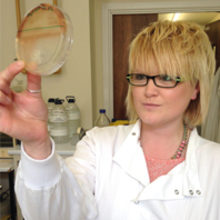Membership Q&A
Issue: Zoonotic diseases
05 November 2015 article

This is a regular column to introduce our members. In this issue, we’re pleased to introduce Angharad Ellen Green.
Where are you currently based?
I am a second year PhD student in the Mahenthiralingam laboratory at the School of Biosciences, Cardiff University. My BBSRC CASE project is industrially funded by Unilever’s ‘Safety and Environmental Assurance Centre’ (SEAC).
What is your area of specialism?
Industrial antimicrobial resistance.
And more specifically?
My PhD focuses on harnessing the power of bacterial bioluminescence to understand the genetic basis of industrial preservative resistance. I have constructed bioluminescence reporters using an industrially isolated strain of Pseudomonas. Light emission alterations are used to identify differentially regulated genes in response to preservatives. To characterise the genetic basis for biosensors of interest, the DNA flanking the transposon insertion is being sequenced using PCR-based techniques. A panel of useful Pseudomonas biosensors will be developed to optimise preservative formulations. I will also use transcriptomic approaches, e.g. RNA sequencing, to validate the results and identify further genes of interest.
Tell us about your education to date
I graduated from Oxford Brookes University in 2010 with a BSc (Hons) in Equine Science, which was followed by an MSc in Medical Microbiology at Cardiff Metropolitan University. My MSc allowed me to publish my first paper on the effect of the flavonol morin on adhesion and aggregation of Streptococcus pyogenes, which developed my passion for research and led on to a PhD at Cardiff University.
Where did your interest in microbiology come from?
At my comprehensive school, by my very enthusiastic and inspiring biology teacher, Mrs Phillips. I loved both horses and biology and discovered the Equine Science degree at Oxford Brookes. My dissertation focused on equine distal limb wound healing and I became fascinated with the wound microbiome. This led on to an MSc in delayed wound healing, biofilms and novel antimicrobial treatments. The experience of publishing my MSc research, in FEMS Microbiology Letters, confirmed my choice of a microbiology PhD.
What are the professional challenges that present themselves and how do you try to overcome them?
When I first started the PhD I found it challenging to successfully manage lab work, while writing up reports and demonstrating in practicals. I overcame this by taking advice from experienced lab members and participating in courses run by Cardiff University’s Graduate Centre. I now feel I can coordinate my time in work effectively, while also having an active lifestyle outside of the laboratory, achieving a good work-life balance.
What is the best part about ‘doing science’?
When an experiment is proving difficult, but you persevere and it works with interesting outcomes. I also find communicating science at conferences and public engagement events rewarding.
Who is your role model?
My PhD supervisor, Professor Eshwar Mahenthiralingam, and everyone within my lab group. There is a collaborative and fun approach to science; I am appreciative to have such great support while starting out in my research career. Everyone is encouraged to discuss their experiments in meetings and there is always someone willing to give advice.
My MSc project supervisor, Dr Sarah Maddocks, is also a role model as she helped develop my research skills during the early stages of my career and encouraged me to publish my findings.
I also want to mention my mum who successfully completed a BSc (Hons) in Mental Health Nursing, while working full-time when my brother and I were young; she’s my inspiration to not give up when faced with difficult challenges.
What do you do to relax?
I like to keep active and enjoy a challenge so I am training for this year’s Cardiff half-marathon. I also own three Welsh Cobs with my mum and so the weekends usually consist of a gallop along the Welsh coast or competing at an event.
What one record and luxury item would you take to a desert island?
My record would be ‘Tragic Kingdom’ by No Doubt, and a Kindle loaded with good books.
Tell us one thing that your work colleagues won’t know about you!
I rode a police horse while I was on work experience at the South Wales Police headquarters, during Year 10 at school.
If you weren’t a scientist, what would you be?
An Egyptologist. I found the ‘Mummy’ film franchise inspiring as a teenager.
If you would like to be featured in this section or know someone who may, contact Paul Easton, Head of Membership Services, at [email protected]
